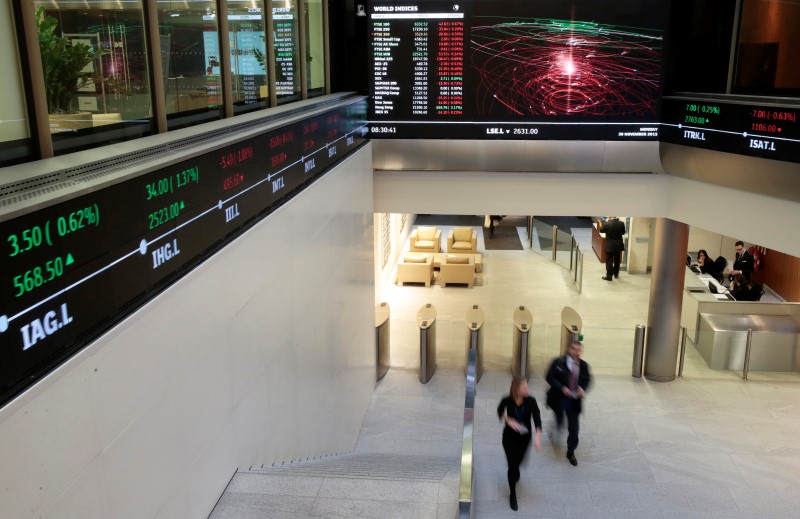By Sujata Rao
(Reuters) - UK-based funds cut equity holdings to a 13-month low in November, amid mounting fears of a slowdown in U.S. and world growth, but allocations to British stocks and bonds rose modestly despite an escalation in Brexit noise.
Reuters' latest asset allocation survey conducted between Nov. 15-29 showed overall equity allocations slipped to 50 percent in global portfolios, down a fraction from last month but almost 5 percentage points down from January levels.
That comes after a torrid October that saw U.S. and world stocks both lose around 7 percent (SPX) (MIWD00000PUS) and while markets bounced in November, positioning likely reflects unease on growth and global trade before U.S. President Donald Trump meets China's Xi Jinping at a G20 summit.
"My expectation is that a meaningful correction will begin in the second half of 2019 which will eventually morph into a bear market in early 2020," Thomas McDonald at Russell Investments said.
In response to a special question on what would be best performing asset class of 2019, almost 60 percent of those who replied picked Asian and emerging equities, citing their weakness this year and cheap valuations.
That was reflected in positioning too, with allocation to non-Japan Asian stocks rising to 10.2 percent, the highest since May and up 1.5 percentage points from October.
Less than a third of respondents picked U.S. equities and tech stocks, which have been hit in recent weeks by doubts on earnings and growth momentum, issues that many reckon could force the U.S. Federal Reserve to pause its rate-hike cycle.
Doubts are growing also about the European Central Bank's ability to raise interest rates in 2019. Poll participants who replied to a special question were almost equally divided on the subject but Andrew Milligan, head of global strategy at Aberdeen Standard Investments, pointed to rising wage pressures.
"A gradual pick up in underlying price pressures should encourage the ECB to take baby-steps, and we anticipate the central bank raising interest rates in December 2019," he added.
The poll was held as British Prime Minister Theresa May agreed a deal with European Union authorities on exiting the bloc in March 2019. While economists, including the Bank of England, warn of a huge economic hit in event of a "no-deal Brexit", the deal could be rejected by parliament.
The newsflow has caused wild swings in sterling but it is flat in November, having fallen in six of the past seven months. Investors raised holdings of British stocks to 22.25 percent, from last month's 20.8 percent, while bond allocations rose 2.5 percentage points to 16.5 percent.
However, holdings of British stocks and bonds have fallen sharply from January levels.
A question about fair value for sterling in event of a no-deal Brexit yielded a wide range of views. But around half of those who replied predicted it to trade between parity to the dollar to $1.10, versus current levels around $1.28 <GBP=D3>.
